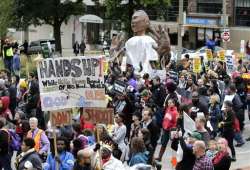Thousands protest police shootings in St. Louis
St. Louis: Thousands of people gathered Saturday for a second day of organized rallies and marches protesting Michael Brown's death and other fatal police shootings in the St. Louis area and elsewhere.Marchers started assembling in

St. Louis: Thousands of people gathered Saturday for a second day of organized rallies and marches protesting Michael Brown's death and other fatal police shootings in the St. Louis area and elsewhere.
Marchers started assembling in the morning hours in downtown St. Louis, where later in the day the Cardinals baseball team was set to host the San Francisco Giants in the first game of the National League Championship Series.
Spurred by a national campaign dubbed Ferguson October, a diverse crowd joined forces. Vietnam-era peace activists, New York City seminarians and hundreds of fast-food workers bused in from Chicago, Nashville and other cities marched alongside local residents.
Four days of events are planned. They started Friday afternoon with a march outside the St. Louis County prosecutor's office in Clayton and renewed calls for prosecutor Bob McCulloch to charge Darren Wilson, a white officer, in the Aug. 9 shooting death of 18-year-old Michael Brown, a black, unarmed 18-year-old, in the St. Louis suburb of Ferguson. Wilson remains free and on administrative leave while a St. Louis County grand jury weighs whether Wilson should face criminal charges.
The U.S. Department of Justice has opened a civil rights investigation of Brown's shooting which led to a nationwide dialogue about interactions between minorities and police.
“We still are knee deep in this situation,” said Kareem Jackson, a St. Louis rap artist and community organizer whose stage name is Tef Poe. “We have not packed up our bags, we have not gone home. This is not a fly-by-night moment.
This is not a made-for-TV revolution. This is real people standing up to a real problem and saying, ‘We ain't taking it no more.”'
The downtown march came hours before the Cardinals game at Busch Stadium, just blocks from the protest route. St. Louis Police Chief Sam Dotson said the city had enlisted extra officers and was prepared for trouble, though he hoped for the best.
Earlier in the week, a small group of protesters verbally clashed with some Cardinals fans who expressed support for the Ferguson officer outside the stadium.
“What I ask is if people come to have their message heard, that they do it in a respectful way,” Dotson said. “And the same thing on the other side (from police supporters). Everybody has a right to have their message heard, whether you like it or not.”
He said the city also will bolster its police presence when the St. Louis Rams host the San Francisco 49ers in a nationally televised pro football game Monday night—the same day protesters are planning organized acts of civil disobedience.
The crowd Saturday was significantly larger than the ones seen at Friday's protests in Ferguson and Clayton. While the main focus of the march was on recent police shootings, participants also embraced such causes as gay rights and the Israel-Palestinian conflict. Police reported no arrests or violence Saturday afternoon.
“I have two sons and a daughter. I want a world for them where the people who are supposed to be community helpers are actually helping, where they can trust those people to protect and serve rather than control and repress,” said Ashlee Wiest-Laird, 48, a Baptist pastor from Boston.
The situation in Missouri especially resonated with Wiest-Laird. She's white and her adopted sons, ages 14 and 11, are black.
“What I see happening here is a moment in time. There's something bigger here,” she said.
Tensions have simmered since Brown's death. Residents were upset about the way Brown's body lay in the street for more than four hours while police investigated the shooting. Many insist Brown was trying to surrender, with his hands up.
Residents also complained about the military-style police response to the several days of riots and protests that erupted immediately after Brown's shooting in the predominantly black St. Louis suburb where just three blacks serve on a 53-officer force.
Organizers said beforehand that they expected as many as 6,000 to 10,000 participants for the weekend's events. Police were not able to provide a crowd estimate Saturday, but organizers and participants suggested the march's size may have approached as many as 3,000.
Since Brown's death, three other fatal police shootings of black males have occurred in the St. Louis area. The most recent happened Wednesday night on St. Louis' south side when police say an off-duty city officer working for a private neighborhood security patrol shot and killed 18-year-old Vonderrit D. Myers.
The white officer, whose name hasn't been released, fired 17 rounds after police say Myers opened fire. Myers' parents say he was unarmed.